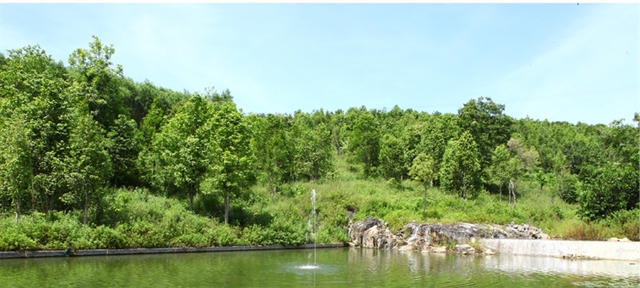 Sunday/Weekend
Sunday/Weekend

By Lê Hương
Wild reed has long been known as strong, rebellious and useless — an invasive plant that takes over uncultivated land. Farmers considered it a kind of 'agricultural waste'.
Yet this hardy, wild plant can actually be used to make environmentally friendly straws and in nutritious food and drinks.
“In the past, if the reeds grew on my land, I could not use them for any purpose,” Nguyễn Thị Lan, a farmer in the outlying district of Quốc Oai told Việt Nam News.
“I had to get rid of it by cutting its roots to farm rice. It grew vigorously, and I had to cut and burn it every day. It hindered my work in the rice field. Even after being burnt, it still grew.”
Soon realising the economic value of the wild reeds, local Hoàng Xuân Đức co-operated with Đinh Thúy Phương to establish the Mana.st company in April 2020, applying an organic circular reed ecosystem to produce straws, drink, and food.
Đức and Phương had worked as volunteers at a rehabilitation centre for drug addicts, so decided to offer jobs to former drug addicts to work at the eco-conscious company.
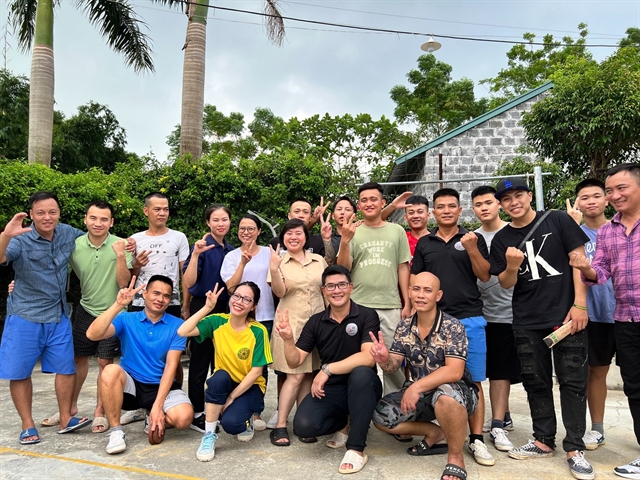 |
| Volunteer teachers and trainees at the rehabilitation centre. Photo courtesy of Đinh Thuý Phương |
Circular economy
“Normal plants take CO2 and release oxygen in the day,” Phương said. “Yet reeds work the other way around. They sleep during the day and wake up at night. They take CO2 and release oxygen at night. So if we can grow many kinds of plants alternatively on land, reeds will help moderate the air.
“By 2025, Việt Nam will trial a market for CO2. Reeds will act as a passive source of income for growers. In wetlands in Denmark, one hectare of reed can help reduce 4 tonnes of CO2.”
Phương said if other plants released oxygen in the air, the reed would work on water.
“Reeds do not cover with leaves on the water and prevent rays of sunlight,” she said. “Aquatic animals in reed-growing areas benefit a lot,” she said.
During the two-year social distancing period, the company planted a new reed hybrid over 10ha in Quốc Oai. The new hybrid's yield almost doubled.
All parts of the plant have been utilised: roots for making reed milk tea, stalks for reusable straws, leaves used as an ingredient to make broth for noodle soup, flowers for crafting souvenir items, and the rest of the plant for a kind of energy tablets.
The new hybrid reeds have stalks to make various types of straws for different purposes.
To enhance the straw’s durability, the company has done research to cover the straw with a kind of celluloid paste, so it is protected from fungi or other microorganisms for up to two years.
The drinking straws can be used at different temperatures, which have been certified by the Ministry of Health as safe.
Phương said the straws had been exported to Europe and North America, and would soon be available in North Asia and South America too. They are being sold on several domestic e-commerce platforms.
Đỗ Ngọc Hòa, CEO of the Raincoffee chain, admired the quality of the straws made of reeds by Mana.st.
“We are among the first companies in the food and beverage business to use these straws,” he said. “It’s been more than 12 months since we started using them. Their colour remains unchanged, and the inside area is clean, not infected by fungi.”
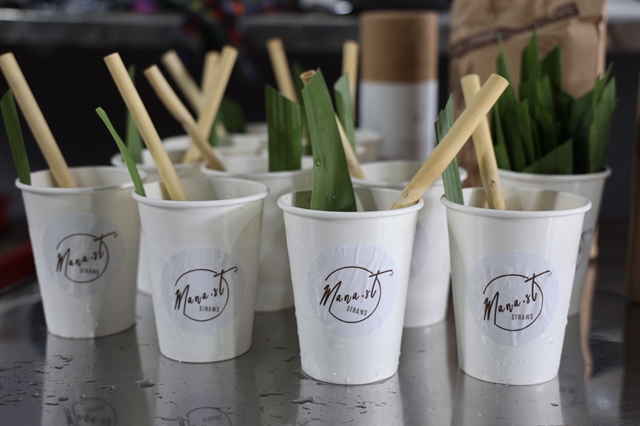 |
| Drinking reeds are warmly welcomed in the market. VNS Photo Minh Phương |
Hòa said most of his customers have given positive feedback on the straws, which are weather-resistant, durable, long-lasting, and reusable.
“In Việt Nam, there has been no regulation of the limitation of using plastic straws,” he said. “Yet many brand names, like our Raincoffee, have gradually shifted to environment-friendly options like those made from paper, rice and bamboo. This is a positive signal. We think we have made a small contribution to the process of being greener, cleaner and reducing plastic waste.”
Nguyễn Thị Chinh, who runs Melly Tea & Juice, said: "Currently, herbal reed milk tea is one of the best-selling milk teas at my shop.
“Most of our customers have their first time trying tea made from reeds at our shop. They are curious, and a bit worried as they think it will taste strange. But they all come back for more, as the tea is delicious and healthy.”
Social responsibility
As the two co-founders of the company met in a rehabilitation centre for drug addicts, they were keen to offer jobs to former addicts.
The company designs classes in technology, leadership, and teamwork to help the former addicts improve their working abilities.
Võ Mạnh Khương, 27, from the southern province of Bình Dương, used drugs for 10 years, but now has a very different life as a production manager at the company.
Looking at such a healthy young man, it is hard to imagine that just two years ago he was a drug addict.
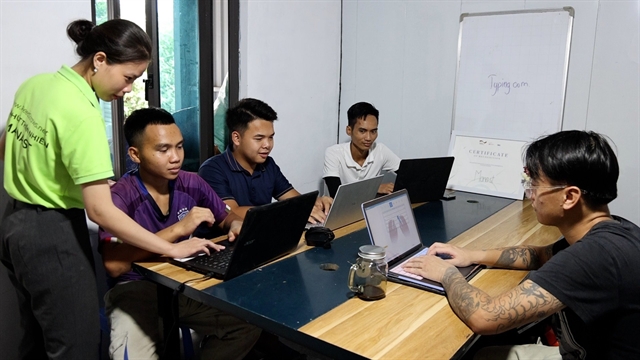 |
| Former drug addicts learn how to use computers at the company. VNS Photo Minh Phương |
“When working here, we are trained in basic knowledge and learn how to do business and personnel management,” he said. “During my time working here, I saw positive changes every day. I hope to open more workshops for the company in other areas.”
Khương said that the chance to work for this company was valuable to him and other former addicts, as they no longer feel worthless.
“Here we can experience love and equality like others,” he said.
Y Ka Bot Nie, an Ê Đê ethnic from the Central Highlands province of Đắk Lắk, said that in the daytime he runs machines at the company workshop and at night studies computers and plays guitar.
“I have now learned how to let go of the old me and try to have a new healthy routine,” he said.
Phương said that the age of drug addicts was getting younger.
“Mana.st wants to equip people with the capability to work,” she said. “So that when they leave the rehabilitation centre, they are financially independent and can stand on their own feet.”
Local farmers also benefit from the company’s policy.
Farmer Lan said each month she got VNĐ5-6 million (US$200-250) from the reeds. Now she doesn’t have to worry much about daily expenses.
“Presently, the reed is very useful,” she said. “I will persuade my neighbours to plant it. It brings more benefits than rice or any other crops. Especially, as we have a reliable wholesale buyer of our reeds.”
Hòa from the Raincoffee chain said he was blown away by the Mana.st story employing former drug addicts in their production line.
“This is an inspiring story, and we wanted to become a Mana.st partner using the company’s straws in our business,” he said.
The company has won various prizes in and outside the country, including third prize at PlastiNovation - a contest aimed at seeking plastic-reduce enterprises to promote circular economy partly sponsored by USAID, Greenhub and FICC.
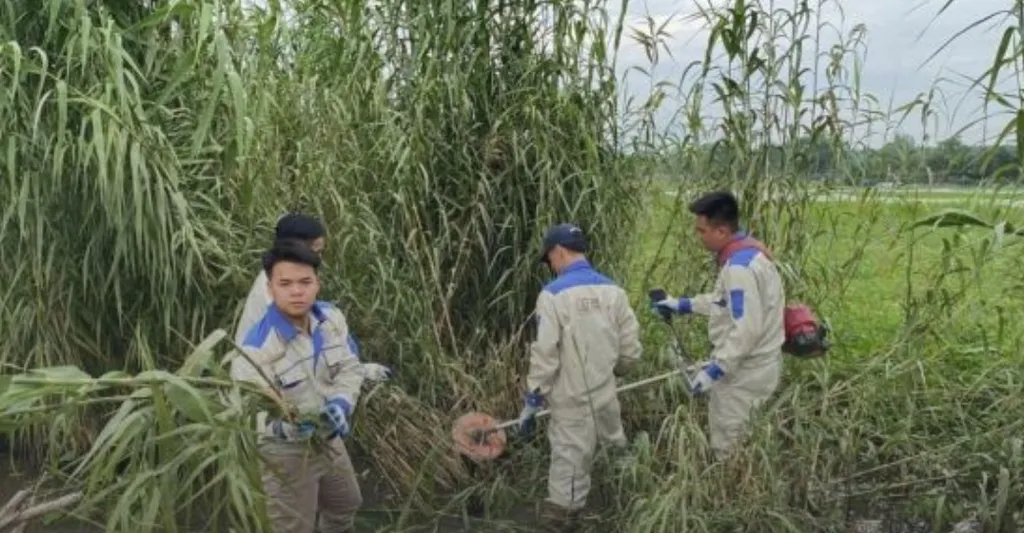 |
| Workers harvest reeds at a local field. VNS Photo Minh Phương |
It also took third prize at a Green Tech Incubator honouring enterprises working in the areas of clean energy and circular economy as part of the Digital Transformation Centre Project, a German government-funded initiative implemented by the Deutsche Gesellschaft für Internationale Zusammenarbeit GmbH, and the National Innovation Centre of the Ministry of Planning and Investment.
Mana.st is listed on the homepage of Vietnam Circular Economy, owned and operated by the UNDP and the Institute of Strategy and Policy on Natural Resources and Environment , as an outstanding example of sustainability. VNS
(Additional interview by Minh Phương)